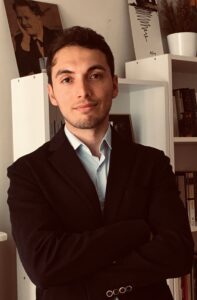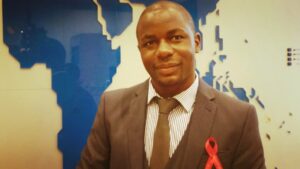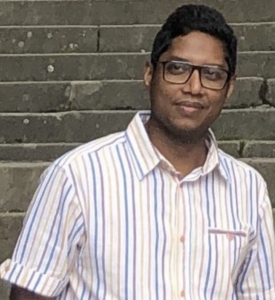In 2022, ICNC with support from the Carnegie Corporation grant, has launched its new entirely Online Teaching Fellowship program where its fellows will develop online courses with customized content specifically designed to meet the needs of their local audience and translated into local languages. The program goal is to increase civil resistance skills and capacity and further civil resistance education to the members of local communities that can become civil resistance knowledge distributors and trainers themselves.
When the program was launched, ICNC has reached out to its 100 star alumni from the ICNC online moderated and participant-led courses that were held over the years. More than 20% of the alumni applied for the new Online Teaching Fellowship by June 2022 and ten fellows were selected from Australia, Bangladesh, Catalonia, China, Kenya, Myanmar, Northern Ireland, Russia, Turkey, and Zimbabwe.
The 2022 Fellows are:
Harley McDonald-Eckersall
Ilker Kalin
Knowledge Mwonzora
Leah Rea
Maria Tsehai
Md. Moynul Haque
Nemo
Lili Soo
Xavier Majó Roca
 Harley McDonald-Eckersall is a social change organiser, specialising in areas of strategic communications and movement strategy. In 2016 at age 19, Harley became involved with the Animal justice movement, co-founding the organisation Young Voices for Animals with the mission to educate and inspire the next generation of animal liberation activists. In January 2020, Harley moved to the UK from Australia to work on narrative and strategy at the social movement organisation Animal Rebellion where she used social movement and narrative theory to bring the impacts of animal farming and fishing into the broader conversation around climate action. Harley has recently returned home to Australia to continue her work as a communicator, facilitator and presenter who is passionate about sharing the power of nonviolent action in creating social change. Harley has presented at a number of conferences and events in Australia and internationally on topics of social change, direct action and civil disobedience.
Harley McDonald-Eckersall is a social change organiser, specialising in areas of strategic communications and movement strategy. In 2016 at age 19, Harley became involved with the Animal justice movement, co-founding the organisation Young Voices for Animals with the mission to educate and inspire the next generation of animal liberation activists. In January 2020, Harley moved to the UK from Australia to work on narrative and strategy at the social movement organisation Animal Rebellion where she used social movement and narrative theory to bring the impacts of animal farming and fishing into the broader conversation around climate action. Harley has recently returned home to Australia to continue her work as a communicator, facilitator and presenter who is passionate about sharing the power of nonviolent action in creating social change. Harley has presented at a number of conferences and events in Australia and internationally on topics of social change, direct action and civil disobedience.
Course Title: Action in the Outback
Course Abstract: When we think about social change movements and civil disobedience, far too often our main points of reference are what happens in cities and urban spaces. Yet, so many of the destructive, violent and exploitative practices we oppose as grassroots campaigners happen far out of the city limits. This course will focus on the potential for nonviolent civil resistance to help rural climate action groups build power and make change in their communities and beyond.
 Ilkler Kalin, PhD, is currently an independent scholar and human rights advocate based in Turkey. He received his PhD in Political Science (majoring in International Relations) from Wayne State University in 2018. His research focuses on the topics of nonviolent action, civil conflicts, state repression, and civil society. He is currently developing a new research agenda that looks into the roles of women’s and LGBTI+ organizations in collective nonviolent dissent. He has so far published a peer-reviewed article on the roles of external actors in the dynamics of nonviolent conflicts at Conflict Management and Peace Science, and a policy brief on academic freedom in Turkey at Freedom House, among others. His main motivation in this line of research is to explore ways to strengthen civil society networks in the Global South and to contribute to the outcomes of movements demanding justice, freedom, and human rights, by improving scholarly work and providing policy recommendations on the topics.
Ilkler Kalin, PhD, is currently an independent scholar and human rights advocate based in Turkey. He received his PhD in Political Science (majoring in International Relations) from Wayne State University in 2018. His research focuses on the topics of nonviolent action, civil conflicts, state repression, and civil society. He is currently developing a new research agenda that looks into the roles of women’s and LGBTI+ organizations in collective nonviolent dissent. He has so far published a peer-reviewed article on the roles of external actors in the dynamics of nonviolent conflicts at Conflict Management and Peace Science, and a policy brief on academic freedom in Turkey at Freedom House, among others. His main motivation in this line of research is to explore ways to strengthen civil society networks in the Global South and to contribute to the outcomes of movements demanding justice, freedom, and human rights, by improving scholarly work and providing policy recommendations on the topics.
Course Title: Civil Resistance: The Theory and Practice of Nonviolent Movements
Course Abstract: Nonviolent movements are considered some of the biggest challenges to entrenched autocratic and populist leaders in the past century owing to their relatively high success rate, outperforming violent opposition groups by a 2-to-1 margin in reaching their stated goals. But what is “civil resistance” (or interchangeably referred as nonviolent direct action and strategic nonviolence)? What exactly constitutes “nonviolent action”? When and why civil resistance works? This course is intended to create awareness on “people power” and to encourage an informed discussion about the strategic advantage of and tactical diversity in nonviolent action. To that end, the course covers key discussions and topics surrounding the concepts, theories, and impacts of nonviolent movements with historical and contemporary examples from around the world. The course also has a special module on the roles of women and gender minorities in resistance movements, which is a relatively new frontier in civil resistance research. Apart from assigned readings and academic lectures, the course also features dialogs with special guest speakers, documentaries, and participant-led discussion sessions.
 Knowledge Mwonzora is an emerging academia, human rights, social justice and peace advocate. He holds the following qualifications: MA in Development studies majoring in Human Rights, Gender, Conflict studies: Social Justice Perspectives from the International Institute of Social Studies, Netherlands, Diploma in Sustainable Development and Human Rights Law from University of Antwerpen, Belgium. He also holds a diploma in Federalism, Decentralization and Conflict Resolution from University of Fribourg, Switzerland. He earned a PhD in Political studies from Northwest University, South Africa in December 2021. His research focused on Transitional Justice and Reconciliation in Zimbabwe with a specific focus on the role of the National Peace and Reconciliation Commission to promote post-conflict justice, peace and reconciliation. He is an alumni of the (International Centre on Nonviolent Conflict) ICNC’ s 2022 participant led online course on Civil Resistance Struggles: How Ordinary People Win Rights, Freedom, and Justice. He is interested in researching on cross cutting issues revolving around transitional justice, reconciliation, civil resistance, nonviolence, climate change, environmental sustainability, human rights, gender and Peace. He was actively engaged in the research and publication of the ‘ Action Aid ‘Youth Climate Action Diaries’ which was aimed at promoting climate justice in Zimbabwe in 2021. He has worked for several organisations that includes a trade union, humanitarian NGOs and research thinktanks. He is currently conducting a nationwide study on Human wildlife conflict in Zimbabwe. He has recently been awarded an Online Teaching Fellowship by the ICNC and will be teaching youths in Zimbabwe on civil resistance struggles in October 2022 and February 2023.
Knowledge Mwonzora is an emerging academia, human rights, social justice and peace advocate. He holds the following qualifications: MA in Development studies majoring in Human Rights, Gender, Conflict studies: Social Justice Perspectives from the International Institute of Social Studies, Netherlands, Diploma in Sustainable Development and Human Rights Law from University of Antwerpen, Belgium. He also holds a diploma in Federalism, Decentralization and Conflict Resolution from University of Fribourg, Switzerland. He earned a PhD in Political studies from Northwest University, South Africa in December 2021. His research focused on Transitional Justice and Reconciliation in Zimbabwe with a specific focus on the role of the National Peace and Reconciliation Commission to promote post-conflict justice, peace and reconciliation. He is an alumni of the (International Centre on Nonviolent Conflict) ICNC’ s 2022 participant led online course on Civil Resistance Struggles: How Ordinary People Win Rights, Freedom, and Justice. He is interested in researching on cross cutting issues revolving around transitional justice, reconciliation, civil resistance, nonviolence, climate change, environmental sustainability, human rights, gender and Peace. He was actively engaged in the research and publication of the ‘ Action Aid ‘Youth Climate Action Diaries’ which was aimed at promoting climate justice in Zimbabwe in 2021. He has worked for several organisations that includes a trade union, humanitarian NGOs and research thinktanks. He is currently conducting a nationwide study on Human wildlife conflict in Zimbabwe. He has recently been awarded an Online Teaching Fellowship by the ICNC and will be teaching youths in Zimbabwe on civil resistance struggles in October 2022 and February 2023.
Course Title: Civil Resistance Struggles History and Nonviolence Movements from a Global to Local Perspective
Course Abstract: The online teaching fellowship will introduce participants to civil resistance. The course will overall teach youths and activists on the history of civil resistance with case studies that illuminate the global patterns of civil resistance, as well as Zimbabwe’s social movements, civil resistance against climate change, Dynamics of non-violent resistance movements, people and power, Civil Resistance in Non-Democracies and democracies, critical analysis and discussion on factors that makes civil resistance succeed with examples from across the world. I will also teach participants on Strategies and Tactics of Civil Resistance and how to maintain non-violence campaigns/movements when provoked by agent provocateurs and state security agents.
 Leah Rea is a scholarship PhD researcher examining the impact of constitutional conventions established by devolution upon the progression of human rights in Northern Ireland at the Transitional Justice Institute, Ulster University. She holds a Master’s with Distinction in Violence, Terrorism and Security, a Master’s with Distinction in Conflict Transformation and Social Justice, and an LLB, all from Queen’s University Belfast.
Leah Rea is a scholarship PhD researcher examining the impact of constitutional conventions established by devolution upon the progression of human rights in Northern Ireland at the Transitional Justice Institute, Ulster University. She holds a Master’s with Distinction in Violence, Terrorism and Security, a Master’s with Distinction in Conflict Transformation and Social Justice, and an LLB, all from Queen’s University Belfast.
Leah is a committed activist with experience in various human rights and equality grassroots campaigns in Northern Ireland, as well as experience in organising campaigns to lobby political representatives and challenge policy. Leah is passionate about social justice and believes that human rights progression and the peace process in Northern Ireland are entwined: to advance one is to advance the other. She believes it is important for contemporary nonviolent movements to learn from historic movements in Northern Ireland, especially in the context of the struggle for the advancement of human rights in the face of State inaction and/or opposition.
Course Title: We Shall Overcome, Then and Now: Learning about Civil Resistance and Social Justice using the History of Northern Ireland
Course Abstract: The course will introduce participants from Northern Ireland to the theoretical and practical study of civil resistance and its methods within the context of specific case studies. Participants will be introduced to the roles and experiences of civil resistance in the context of historic and contemporary campaigns challenging social injustice and human rights issues in Northern Ireland. The course will facilitate the study of the historic Northern Ireland civil rights movement within the period 1964-1969 and contemporary campaigns including in the areas of reproductive healthcare rights and Irish language rights. This comparative examination will provide an insight into the methods, tactics and strategies of these movements, focusing upon civil resistance. Further it shall determine their effectiveness, enabling participants to observe trends and commonality of issues and responses which can inform their knowledge and understanding of the practice of civil resistance as a means of addressing injustice.
 Maria Tsehai is a communication expert and a media personality. Ms. Sarungi- Tsehai is known for a wide varied action-packed career in activism, pushing for the freedom of expression and press freedom in Tanzania. She is the co- founder of the citizens’ social media movement called Change Tanzania and a well-known vocal advocate for democracy and rule of law through her widely followed Twitter account. She has led and organized a number of successful online petitions, online protests calling for the abolishment of unfair taxes, freeing of illegally detained activists and politicians also advocating for a new constitution in Tanzania.
Maria Tsehai is a communication expert and a media personality. Ms. Sarungi- Tsehai is known for a wide varied action-packed career in activism, pushing for the freedom of expression and press freedom in Tanzania. She is the co- founder of the citizens’ social media movement called Change Tanzania and a well-known vocal advocate for democracy and rule of law through her widely followed Twitter account. She has led and organized a number of successful online petitions, online protests calling for the abolishment of unfair taxes, freeing of illegally detained activists and politicians also advocating for a new constitution in Tanzania.
Course Title: Wenye Nchi Wananchi – Citizen Power
Course Abstract: This course is for Swahili speakers, largely focusing on providing more information about what citizen power is really about in civil activism and resistance. In a time when many countries in the Eastern Africa region are facing increased threats to civic space, what can citizens do to resist and keep the civic space alive. This course is aimed primarily at active citizens, young emerging activists in Tanzania and in the region who want to build more understanding and background to civil resistance and movement building.
 Md. Moynul Haque is a faculty member at the Department of Political Science, Jagannath University, Dhaka, Bangladesh. He is currently pursuing PhD in Sociology at Bielefeld Graduate School in History and Sociology (BGHS), Bielefeld University, Germany. His research focuses on civil resistance in Bangladesh with particular attention to student protest activism. Moynul received Bachelor and Master’s degree in Political Science from the University of Dhaka. He was the recipient of the German DAAD scholarship in 2013 and studied MA in Development and Governance at the Institute of Political Science, University of Duisburg- Essen, Germany.
Md. Moynul Haque is a faculty member at the Department of Political Science, Jagannath University, Dhaka, Bangladesh. He is currently pursuing PhD in Sociology at Bielefeld Graduate School in History and Sociology (BGHS), Bielefeld University, Germany. His research focuses on civil resistance in Bangladesh with particular attention to student protest activism. Moynul received Bachelor and Master’s degree in Political Science from the University of Dhaka. He was the recipient of the German DAAD scholarship in 2013 and studied MA in Development and Governance at the Institute of Political Science, University of Duisburg- Essen, Germany.
Course Title: Introduction to Study and Practice of Civil Resistance
Course Abstract: This course provides a brief introduction to the concept of civil resistance by capturing various terminologies, relevance, scholarly debates, and the development of this emerging field of study. It will allow participants to know why civil resistance works, and orients students with the strategies and skills require to make a civil resistance campaign more sustainable. Students will learn historical records of the efficacy and potentials of nonviolent conflict that brought positive outcome, side by side know about the unsuccessful cases. Participants will also be informed about the catalytic civil resistance episodes that brought major political transformation in South Asia. In particular, students will gain substantive knowledge on Bangladeshi people’s nonviolent struggles of both pre- and post-independence periods.
![]() Nemo graduated with an engineering degree from a university in Yangon in 2016. My knowledge about nonviolent civil resistance was minimal until the military coup in February 2021. After the coup, I started reading books by Dr. Gene Sharp about nonviolent resistance and people power. In May 2021, I co-founded Freedom Fighter Myanmar with a few friends in order to spread public awareness about the elements of an effective civil resistance. I facilitate research, training and discussions to promote capacity building for grassroots people using a bottom-up approach.
Nemo graduated with an engineering degree from a university in Yangon in 2016. My knowledge about nonviolent civil resistance was minimal until the military coup in February 2021. After the coup, I started reading books by Dr. Gene Sharp about nonviolent resistance and people power. In May 2021, I co-founded Freedom Fighter Myanmar with a few friends in order to spread public awareness about the elements of an effective civil resistance. I facilitate research, training and discussions to promote capacity building for grassroots people using a bottom-up approach.
Course Title: Essentials of People Power and Civil Resistance
Course Abstract: In this 24-days course, we will study the foundations of civil resistance and its strategies and tactics. Essential elements of nonviolent resistance such as sources of power will be introduced and the mechanisms which ordinary people can utilize to bring about change will be explained. The course language will be Burmese with all required texts and videos provided in Burmese translations. The last part of the course will focus on the contemporary people’s resistance in Myanmar where the participants are given an opportunity to apply what they have learned and contribute to the revolution through peer discussions.
Lili Soo has been a teacher and activist for more than a decade, and finished his education in the United Kingdom.
Lili has been engaged in human rights cause from perspectives of academic study too. Lili has studied courses related to human rights theories (with a focus on immigrants) from Oxford University as well as the theories of activism from ICNC.
Lili Soo has been sharing his knowledge on social media platforms such as Telegram, Twitter, and YouTube. His teachings have drawn interest from thousands of people of multiple backgrounds, including students, young professionals, and activists from around the world.
Course Title: Theory and Practices of Activism
Course Abstract: The course aims to inform the learners of what is activism, how and why activism in peaceful ways, including ‘subversions of governments’ or ‘colored revolutions’, as termed and criminalized by authoritarian regimes, is legitimate in international societies as well as legally protected and supported worldwide along with solid histories and relevant academic researches. The course also aims to help the learners with their attempts of developing their strategies of future activism. The course welcomes participants from all backgrounds, with or without higher educational experiences. Out of security concerns, the course encourages all applicants to use protonmail.com (or proton.me) for all the future communications from applications through studies.
 Xavier Majó Roca was born in 1959 in Arenys de Munt (30 miles north of Barcelona). Since my youth I have been involved in actions against militarism (I was conscientious objector in 1985, I campaigned against Spain becoming member of NATO in 1986 and since 1990 I am a fiscal objector to the Government budget for the Ministry of Defence (military defence). Last years I have manly been involved in the pro-independence Catalan movement and occasionally participating in actions against climate change and militarism. I am member of Lluitanoviolenta.cat that promotes nonviolent methods for struggling for Justice and Human Rights. I have been teaching nonviolence for 4 years. Apart from self-training, I have been trained by the International Institute for Nonviolent Action (NOVACT) and by the International Center on Nonviolent Conflict (ICNC).
Xavier Majó Roca was born in 1959 in Arenys de Munt (30 miles north of Barcelona). Since my youth I have been involved in actions against militarism (I was conscientious objector in 1985, I campaigned against Spain becoming member of NATO in 1986 and since 1990 I am a fiscal objector to the Government budget for the Ministry of Defence (military defence). Last years I have manly been involved in the pro-independence Catalan movement and occasionally participating in actions against climate change and militarism. I am member of Lluitanoviolenta.cat that promotes nonviolent methods for struggling for Justice and Human Rights. I have been teaching nonviolence for 4 years. Apart from self-training, I have been trained by the International Institute for Nonviolent Action (NOVACT) and by the International Center on Nonviolent Conflict (ICNC).
Course Title: Nonviolence: Strategy and Methods to Fight for Civil Rights and Justice
Course Abstract: The course will be an introduction to nonviolence. From “what nonviolent struggle really is” to “why nonviolent struggle can be more effective”, with a detailed description of the methods and strategy of how nonviolent action is developed and evaluated. In addition, the sources of power of the adversary and how to build power from a nonviolent standpoint will be described. How to strengthen and care for the organization, and the historical roots and leaders of nonviolence.